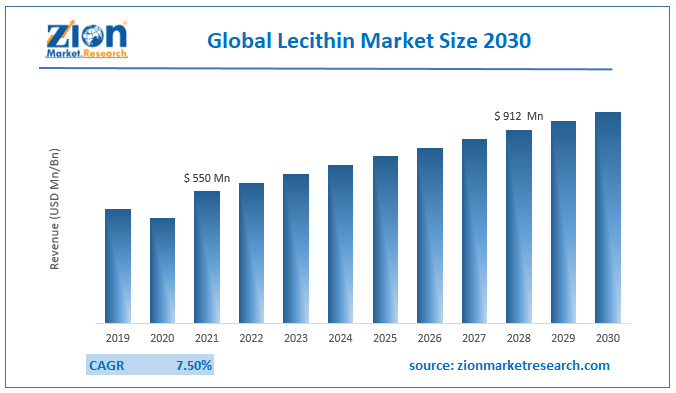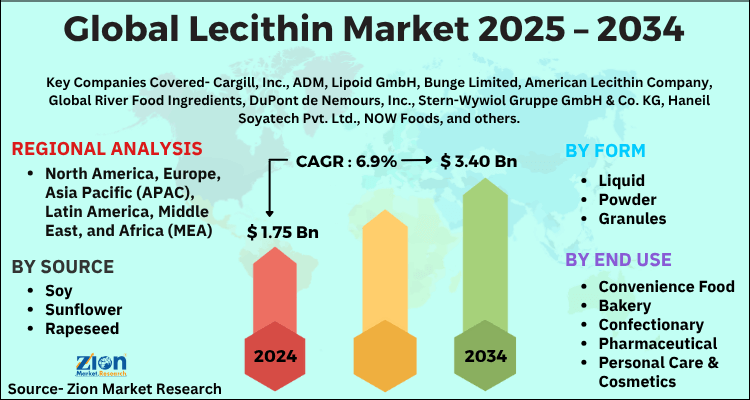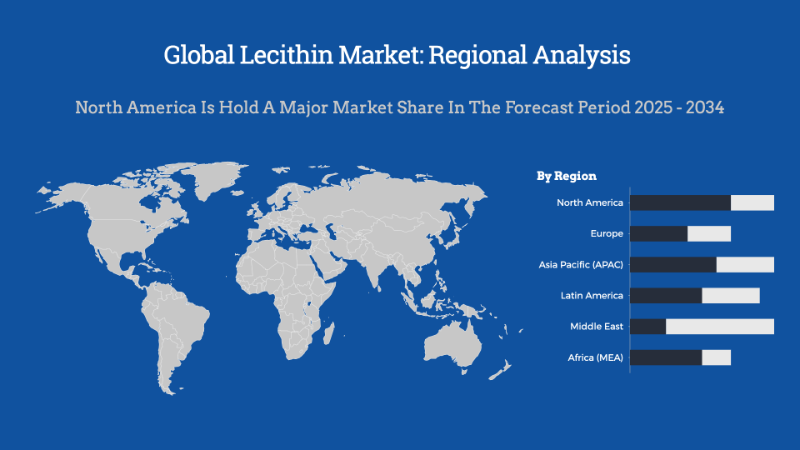Global Lecithin Market Size, Share, Growth Analysis Report - Forecast 2034

Lecithin Market By Source (Soy, Sunflower, Rapeseed, Others), By End Use (Convenience Foods, Bakery, Confectionary, Pharmaceuticals & Personal Care, Personal Care & Cosmetics, Animal Feed, Industrial, Other), By Form (Liquid, Powder, Granules), and By Region: Global and Regional Industry Overview, Market Intelligence, Comprehensive Analysis, Historical Data, and Forecasts 2025 - 2034
| Market Size in 2024 | Market Forecast in 2034 | CAGR (in %) | Base Year |
|---|---|---|---|
| USD 1.75 Billion | USD 3.40 Billion | 6.9% | 2024 |
Global Lecithin Market: Industry Perspective
The global lecithin market size was worth around USD 1.75 Billion in 2024 and is predicted to grow to around USD 3.40 Billion by 2034 with a compound annual growth rate (CAGR) of roughly 6.9% between 2025 and 2034. The report analyzes the global lecithin market's drivers, restraints/challenges, and the effect they have on the demands during the projection period. In addition, the report explores emerging opportunities in the lecithin industry.
Global Lecithin Market: Overview
Lecithin is derived from various commercial sources such as sunflower, egg yolks, soybeans, and many others. It is used in numerous industrial applications, which includes cosmetic, food and beverage, and pharmaceutical. It possesses several unique characteristics such as repelling sticky material, smoothening textures of food, homogenizing mixtures in liquid, stabilizing agent, for dissolving powders, and emulsifier.
Different types of lecithin available in the market are refined lecithin and unrefined lecithin. Refined lecithin is unified with alcohol, phospholipids, and others. Unrefined lecithin is natural lecithin which is obtained from natural sources. They are extracted from sunflowers, soybeans, and others. However, chemically modified lecithin is generally modified through chemical treatments.
Global Lecithin Market: Growth Drivers
The organic nature of lecithin drives the market
Lecithin is a naturally occurring ingredient that appears in a range of foods. According to studies, lecithin is necessary for the healthy operation of the liver, nerves, brain, and other important organs. Lecithin is a beneficial dietary supplement that's also utilized to create eye drops, skin moisturizers, and food emulsifiers.
These ingredients improve one's health and spirit when taken as dietary supplements. As a result, the global lecithin market is anticipated to grow significantly during the coming years. Healthy-living individuals are more prone to use dietary supplements to maintain their health and enhance their mood. As a result, a preoccupation with preventative healthcare and potent endorsement partnerships for lifestyle-improving products have propelled the demand for lecithin in the dietary supplement industry. The main factor affecting the market is the rising consumer demand for food ingredients made from various dietary sources. Thus, the organic nature of lecithin along with rising awareness among individuals is expected to propel the market during the forecast period.
Restraints:
Volatility in the price of the raw material is expected to impede the market growth
It can be challenging for the major players to plan their budgets for the upcoming initiatives because the costs of the raw materials are subject to fluctuation. Additionally, there are stringent government regulations in many places, which has led to a lack of consistency in the products' standards compliance and level of quality. The less developed economies have not yet reached the point where they are cognizant of the problem. Additionally, it is impossible to ignore the fact that certain people have a soybean allergy. Parents are also advised to keep lecithin out of the reach of their kids because there is insufficient data to support its safety.
Opportunities:
Increasing uses of lecithin in cosmetics and pharmaceuticals provide lucrative opportunity for the market growth
The increasing use of lecithin in cosmetics and pharmaceuticals is expected to provide a lucrative opportunity for the global lecithin market expansion during the forecast period. Diets high in lecithin increase HDL cholesterol levels while reducing LDL cholesterol. Lecithin supplements are also regarded to be advantageous for diabetics. Lecithin has received the US Food and Drug Administration's designation of "generally regarded as safe." When taken as prescribed, there are no known negative effects. More people are therefore aware of the advantages of using lecithin supplements.
In the cosmetics industry, Lecithin is becoming more popular, particularly in the field of skincare. Lecithin's capacity to lower the surface tension of the constituents is useful for emulsions as well. New skincare and personal care products are being introduced by top cosmetics brands in a variety of categories. Praan Naturals currently offers more than 500 certified organic and conventionally sustainable materials for the production of personal care items, including Organic Sunflower and Soy Lecithin Powder and Liquid. The growing demand for organic products in the cosmetic and personal care industries is driving up the price of soy-based lecithin.
Key Insights
- As per the analysis shared by our research analyst, the global lecithin market is estimated to grow annually at a CAGR of around 6.9% over the forecast period (2025-2034).
- Regarding revenue, the global lecithin market size was valued at around USD 1.75 Billion in 2024 and is projected to reach USD 3.40 Billion by 2034.
- The lecithin market is projected to grow at a significant rate due to increasing consumer demand for natural and clean-label ingredients across food, pharmaceutical, and cosmetic industries, alongside the rising preference for plant-based and non-GMO products, and its versatile applications as an emulsifier and stabilizer i.
- Based on Source, the Soy segment is expected to lead the global market.
- On the basis of End Use, the Convenience Foods segment is growing at a high rate and will continue to dominate the global market.
- Based on the Form, the Liquid segment is projected to swipe the largest market share.
- Based on region, North America is predicted to dominate the global market during the forecast period.
Global Lecithin Market: Report Scope
| Report Attributes | Report Details |
|---|---|
| Report Name | Lecithin Market |
| Market Size in 2024 | USD 1.75 Billion |
| Market Forecast in 2034 | USD 3.40 Billion |
| Growth Rate | CAGR of 6.9% |
| Number of Pages | 199 |
| Key Companies Covered | Cargill, Inc., ADM, Lipoid GmbH, Bunge Limited, American Lecithin Company, Global River Food Ingredients, DuPont de Nemours, Inc., Stern-Wywiol Gruppe GmbH & Co. KG, Haneil Soyatech Pvt. Ltd., NOW Foods, and others. |
| Segments Covered | By Source, By End Use, By Form, and By Region |
| Regions Covered | North America, Europe, Asia Pacific (APAC), Latin America, The Middle East and Africa (MEA) |
| Base Year | 2024 |
| Historical Year | 2020 to 2023 |
| Forecast Year | 2025 - 2034 |
| Customization Scope | Avail customized purchase options to meet your exact research needs. Request For Customization |
Global Lecithin Market: Segmentation
The global lecithin market is segmented based on the source, form, end-use, and region. All the segments have been analyzed based on present and future trends and the market is estimated from 2025 to 2034.
Based on the source, the global market is bifurcated into soy, sunflower, rapeseed, and others. The soy segment accounted for the largest revenue share of more than 70% in 2024 and is expected to show its dominance during the forecast period. This can be attributed to the expanding food business in regions of Europe and Asia-Pacific, where large tracts of land are used for soybean production and cultivation. It is mostly employed in the production of dairy goods, ice cream, nutritional supplements, newborn formulae, bread, margarine, and other ready-to-eat meals.
However, it is anticipated that during the projected period, demand would decline due to growing concern about rising cholesterol levels and the allergenic qualities of soybean. Besides, the sunflower segment is expected to grow at a significant rate during the forecast period owing to the wide range of benefits provided by sunflowers. Additionally, due to its rising use in the production of supplements, the demand for sunflower lecithin is anticipated to remain high.
Based on form, the market is segmented into liquid, powder, and granules. The liquid segment accounted for the largest revenue share of over 80% in 2024 and is expected to maintain its dominance during the forecast period. A significant increase in the demand for liquid form across a variety of end-use application industries, including industrial coatings, cosmetics, food processing, and confectioneries, is responsible for this high share.
While it is ingested as a dietary supplement in addition to being utilized in liquid form as a food additive or naturally in many food products. Instead of being pure phosphatidylcholine, liquid lecithin in dietary supplements is typically a blend of choline, inositol, phosphatidylcholine, phosphatide, and other substances. Additionally, compared to its other forms, the liquid form permeates in oil more easily. On the other hand, the powder segment is expected to grow at a significant rate over the forecast period.
Several end-use sectors, including feed, food & beverage, cosmetics, and pharmaceuticals, among others, employ lecithin powder as an ingredient. Products for bakeries and confectioneries typically contain the ingredient. To stop baked goods from adhering to the pans, the powder form is added to cooking sprays. Additionally, it has the remarkable ability to bind with both lipids and non-lipids, keeping substances containing both water and oil together. Key manufacturers favor powder over liquid in food items such as butter and confectionery for the same reason.
Based on end-use, the global lecithin market is bifurcated into convenience food, bakery, confectionary, pharmaceutical, personal care & cosmetics, animal feed, and others. The animal feed segment is projected to dominate the market during the forecast period owing to the ever-rising meat consumption by the majority of the population across the globe.
Moreover, the highly developed animal husbandry sector has contributed favorably to the industry's expansion. On the other hand, the convenience food segment is expected to hold a significant market share throughout the forecast period. When making food at home or in a restaurant, convenience foods save time and energy.
Lecithin helps to bind fat and keep it suspended in convenience food products, improve the hydration of high-protein components, lower the fat cap during the retort process, and improve the dispersion of high-fat powders. Additionally, its outstanding abilities to enhance mouthfeel and texture and make it easier for ingredients to be distributed evenly are anticipated to support its inclusion in the convenience food segment.
The Regional, this segment includes the current and forecast demand for North America, Europe, Asia Pacific, Latin America,and the Middle East and Africa.
Recent Developments:
- In March 2024, for lecithin and phospholipids in North America, Lecico and Ciranda announced a distribution collaboration with a focus on clean-label food trends and regional commercial and technical support.
- In February 2024, for the European market, Strenchemie introduced soy lecithin dairy substitutes. Additionally, the FDA issued a GRAS no-objection notice to the company in April 2024 for its assortment of sunflower-based lecithin.
Global Lecithin Market: Regional Analysis
The lecithin market exhibits diverse regional dynamics, with Asia-Pacific leading due to rising demand from the food, pharmaceutical, and cosmetics industries, particularly in countries like China and India where rapid urbanization and changing dietary habits boost consumption. North America holds a significant share, driven by health-conscious consumers and the widespread use of lecithin in processed foods and dietary supplements, while Europe follows closely, supported by stringent regulations promoting natural emulsifiers and clean-label products. Meanwhile, Latin America and the Middle East & Africa show growing potential as emerging markets, fueled by expanding food processing industries and increasing awareness of lecithin’s functional and health benefits.
Global Lecithin Market: Competitive Analysis
The report provides a company market share analysis to give a broader overview of the key market players. In addition, the report also covers key strategic developments of the market, including acquisitions & mergers, new product launches, agreements, partnerships, collaborations & joint ventures, research & development, and regional expansion of major participants involved in the lecithin market on a global and regional basis.
The global lecithin market is dominated by players like:
- Cargill Inc.
- ADM
- Lipoid GmbH
- Bunge Limited
- American Lecithin Company
- Global River Food Ingredients
- DuPont de Nemours Inc.
- Stern-Wywiol Gruppe GmbH & Co. KG
- Haneil Soyatech Pvt. Ltd.
- NOW Foods
Global Lecithin Market: Segmentation Analysis
The global lecithin market is segmented as follows:
By Source
- Soy
- Sunflower
- Rapeseed
- Others
By Form
- Liquid
- Powder
- Granules
By End-use
- Convenience Food
- Bakery
- Confectionary
- Pharmaceutical
- Personal Care & Cosmetics
- Animal Feed
- Others
Global Lecithin Market: Regional Segment Analysis
- North America
- The U.S.
- Canada
- Europe
- France
- The UK
- Spain
- Germany
- Italy
- Rest of Europe
- Asia Pacific
- China
- Japan
- India
- South Korea
- Southeast Asia
- Rest of Asia Pacific
- Latin America
- Brazil
- Mexico
- Rest of Latin America
- Middle East & Africa
- GCC
- South Africa
- Rest of Middle East & Africa
Table Of Content
Methodology
FrequentlyAsked Questions
Lecithin is derived from various commercial sources such as sunflower, egg yolks, soybeans, and many others. It is used in numerous industrial applications, which includes cosmetic, food and beverage, and pharmaceutical. It possesses several unique characteristics such as repelling sticky material, smoothening textures of food, homogenizing mixtures in liquid, stabilizing agent, for dissolving powders, and emulsifier.
The global lecithin market is expected to grow due to rising demand in food & beverage as an emulsifier, growing health awareness, increasing applications in pharmaceuticals and cosmetics, and expansion in animal feed and industrial uses.
According to a study, the global lecithin market size was worth around USD 1.75 Billion in 2024 and is expected to reach USD 3.40 Billion by 2034.
The global lecithin market is expected to grow at a CAGR of 6.9% during the forecast period.
North America is expected to dominate the lecithin market over the forecast period.
Leading players in the global lecithin market include Cargill, Inc., ADM, Lipoid GmbH, Bunge Limited, American Lecithin Company, Global River Food Ingredients, DuPont de Nemours, Inc., Stern-Wywiol Gruppe GmbH & Co. KG, Haneil Soyatech Pvt. Ltd., NOW Foods, among others.
The report explores crucial aspects of the lecithin market, including a detailed discussion of existing growth factors and restraints, while also examining future growth opportunities and challenges that impact the market.
RelatedNews
HappyClients
Zion Market Research
Tel: +1 (302) 444-0166
USA/Canada Toll Free No.+1 (855) 465-4651
3rd Floor,
Mrunal Paradise, Opp Maharaja Hotel,
Pimple Gurav, Pune 411061,
Maharashtra, India
Phone No +91 7768 006 007, +91 7768 006 008
US OFFICE NO +1 (302) 444-0166
US/CAN TOLL FREE +1 (855) 465-4651
Email: sales@zionmarketresearch.com
We have secured system to process your transaction.
Our support available to help you 24 hours a day, five days a week.
Monday - Friday: 9AM - 6PM
Saturday - Sunday: Closed







